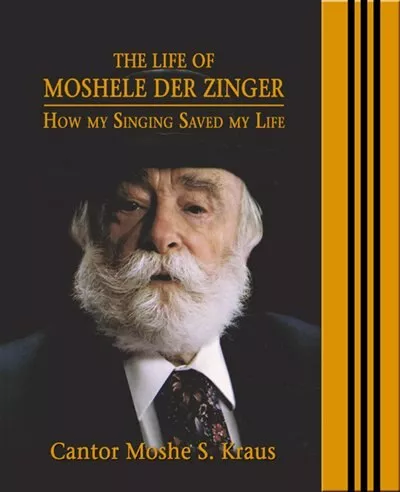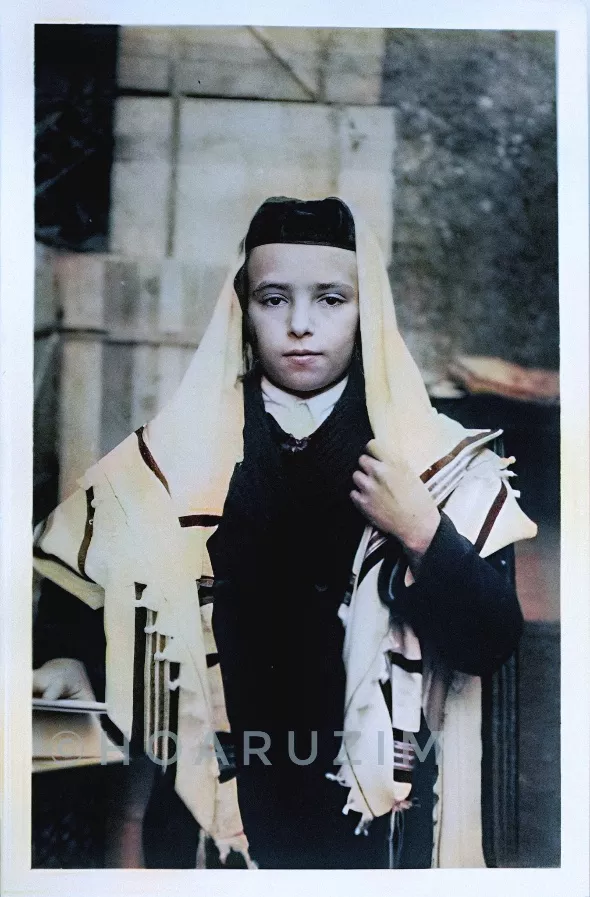Moshele Der Zinger (Moshele the Singer)
The cantor Moshe Shimon Kraus z”l, on his passing.
By: Yaakov Rosenfeld, Ganzach Kiddush Hashem
It was with great sadness that we received the news of the passing of the elderly chassid, Rabbi Moshe Shimon Kraus (Moshele) z”l.
The cantor, born in Munkacs, survived the war and was widely known as a gifted cantor, a charming man who always had a smile on his face, a smile that did not betray in the slightest what happened to the “prodigy child.” The cantor Moshele Kraus was taken out of the depths of the abyss by the Sanz-Klausenberger Rebbe, known as the “Shefa Adam”, with his own hands. The Rebbe brought him brought him back to a life of Torah and mitzvahs, in the difficult days after the war.
Moshe, whose story that was published as a video testimony by Ganzach Kiddush Hashem evoked much attention, returned his soul at the age of 101, lucid and eloquent until almost the last moment.
Moshe was not privileged to leave descendants, and we at Ganzach Kiddush Hashem, will remember him forever and learn and pray for the ascension of his soul.
Moshe’s story is not unique in the usual sense of the term “uniqueness”. Many of the Holocaust refugees who lost everything they owned were able to return to life in a miraculous and wonderous way, thanks to the love and devotion of the great Jewish religious leaders who also survived the Holocaust and lost everything they owned, but did not sink into the abyss of despair and gloom, but rather chose life and not only that, breathed a spirit of life into all around them, in the dry bones that lay motionless in the refugee camps, their souls burning with little light and heat. Moshe, however, was gifted with a rare pleasantness and an extraordinary ability to speak and lecture, and that is why his moving story found and audience in so many hearts in Israel and the rest of the world. And this is actually the uniqueness of the testimony of Moshe, the famous cantor, that we in Ganzach Kiddush Hashem were the messengers in publishing.
Moshe was full of emotion, and in his miraculous testimony, tears flowed from his eyes, and his tears opened the gates to the hearts of hundreds of thousands of people who watched his words and shed tears as well.
The testimony of Moshe Kraus z”l:

His memoir
His life story from Wikipedia:
Moshe Kraus was born in Munkacs. As a youth, he studied at a yeshiva in the city of Munkacs and studied how to be a cantor under Cantor Leibush Miller. In 1939 he was appointed cantor in the city of Sziget, and in 1940 he moved to Budapest to serve as cantor there. He survived the Second World War in the Bergen-Belsen concentration camp. After the war, he immigrated to the State of Israel and enlisted in the IDF. He first served as an instructor in the armory, but when he was invited to sing the blessings at the chupah of a member of the army, the Chief of Staff at the time, Yigal Yadin, heard him and suggested that he be appointed the first Chief Military Cantor. When he asked to be released at the end of his regular service, he was summoned again to Yadin who asked him to sign for two more years and Kraus agreed to the request.
After his release from the IDF, in 1952, he moved to Antwerp, Belgium, where he served as the main cantor of the community. Following health problems his wife was suffering from, the doctors advised them to move to a warmer climate, and in 1956, Kraus accepted the invitation of the community in Johannesburg and moved to South Africa. Following the difficult political situation in South Africa, Krauss moved in 1968 to serve as a cantor in Ottawa, the capital of Canada, where he lived until his death in 5783 (2023).

Moshe, as a child prodigy cantor prewar












